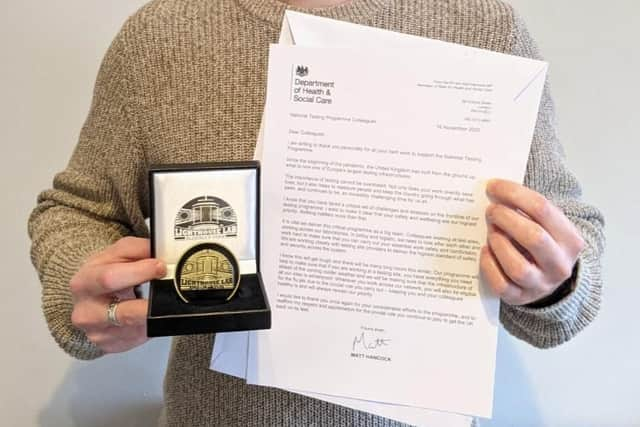Sheffield Hallam student awarded medal by Health Secretary for vital work against Covid-19
and live on Freeview channel 276
Rob Tempest, whose PhD studies were impacted by the current Covid-19 restrictions, received a letter and medal from Matt Hancock after he volunteered at the Alderley Park Lighthouse Laboratory to help test swab samples for the coronavirus testing process.
The lab which is one of six across the UK’s Lighthouse Laboratory network, had previously issued a call for experienced scientists to help them increase testing and combat the Covid-19 pandemic as part of the Government’s plans.
Advertisement
Hide AdAdvertisement
Hide AdRob decided to play his part in reducing the spread of the virus by volunteering to work for the lab in Cheshire, commuting from Sheffield to the Alderley Edge site each day.


The PhD student progressed from being a laboratory scientist to taking a bioscience lead role and overseeing teams of up to 10 who work on the Polymerase Chain Reaction (PCR) diagnostic tests.
Rob and his colleagues’ lifesaving work caught the attention of the Secretary of State for Health and Social Care, Matt Hancock, who wrote a letter to the laboratory staff and awarded them all a medal in recognition of their contribution to the ongoing fight against Covid-19.
In the letter, Mr Hancock wrote: “The importance of testing cannot be overstated.
Advertisement
Hide AdAdvertisement
Hide Ad“Not only does your work directly save lives, but it also helps to reassure people and keep the country going through what has been, and continues to be, an incredibly challenging time for us all.”
Sheffield Hallam student Rob is continuing his PhD work into researching the link between obesity and bowel cancer and is expecting to welcome a baby daughter into his family in the coming months.
“As the national lockdown resulted in the closure of the university laboratories for six months, I was keen to put my skills to good use in the fight against Covid-19,” Rob said.
“As a member of the team at Alderley Edge Lighthouse Labs I have been part of the national sample testing effort, working as a bioscience lead and supervising groups of scientists performing the PCR diagnostic test.
Advertisement
Hide AdAdvertisement
Hide Ad“This has been an amazing experience, not only in helping facilitate the essential testing required to combat the virus, but in building experience and skills I can take forward in my career.”
Postgraduate research tutor for the Biomolecular Sciences Research Centre, Dr Catherine Duckett, commented: “We are not surprised that he got the role and has done well, progressing up the ladder in such a short space of time.
“In what he has done it collectively showcases what all of our students are capable off.”
Dr Nicholas Peake, a senior lecturer in Biomedical Science at Sheffield Hallam University and director of studies on Rob’s PhD project added: “Rob has previously worked in a commercial laboratory as a bioanalyst and as a laboratory technician and has further enhanced his laboratory skills during his PhD, so he was a natural fit to support the Covid testing program.”
In these confusing and worrying times, local journalism is more vital than ever. Thanks to everyone who helps us ask the questions that matter by taking out a digital subscription or buying a paper. We stand together. Nancy Fielder, editor.
Comment Guidelines
National World encourages reader discussion on our stories. User feedback, insights and back-and-forth exchanges add a rich layer of context to reporting. Please review our Community Guidelines before commenting.